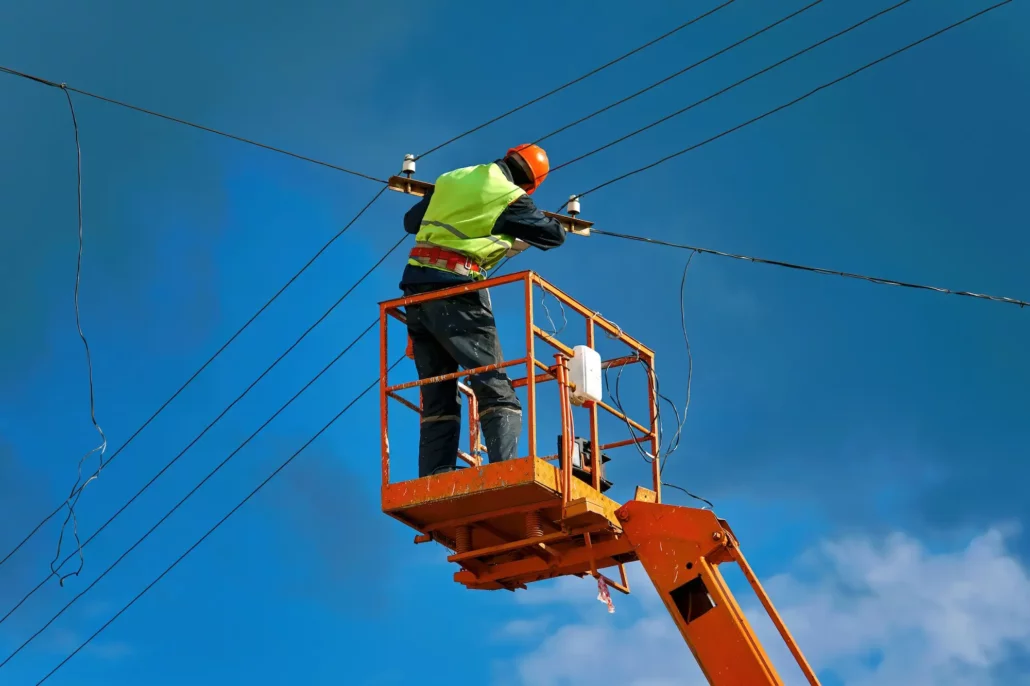Essential Protection for Florida Workers
In Florida, workers’ compensation insurance is more than a legal requirement; it’s a vital safeguard for your business and workforce. This coverage isn’t just about ticking a box for compliance – it’s an investment in the well-being and recovery of your employees, ensuring they receive the care they need after a work-related injury or illness. At Peoples First Insurance, we understand the importance of balancing cost with comprehensive protection. We’re dedicated to guiding Florida businesses, large or small, through the complexities of workers’ compensation insurance, ensuring you get the right coverage without overpaying. Let us help protect your team and your business, keeping everyone covered and confident, no matter what the workday holds.
Key Takeaways
- Mandatory Coverage: In Florida, most businesses are required to have workers’ compensation insurance, ensuring that employees are protected in case of work-related injuries or illnesses.
- Employee Benefits: This insurance provides crucial benefits such as medical care, wage replacement, and rehabilitation services for employees who suffer work-related injuries or illnesses.
- Employer Protection: Workers’ compensation coverage shields employers from costly lawsuits and provides legal liability coverage for work-related accidents.
- Cost Variation: The cost of workers’ compensation insurance in Florida varies depending on factors like industry, job risk, and claim history, emphasizing the importance of finding a tailored plan.
- Exemption Rules: Certain businesses and employees, such as those in specific industries or corporate officers, may be exempt from mandatory coverage, but understanding these nuances is key.
Get a Free Workers’ Compensation Insurance Quote for Panama City and Tallahassee Today!
Are you seeking comprehensive workers’ compensation insurance for your business? Whether you’re ready for a personalized quote or just have questions about your coverage options, our team at Peoples First Insurance is here to provide expert guidance. We understand the unique needs of businesses in Panama City and Tallahassee and are dedicated to helping you at every stage of your insurance journey.
Understanding Workers’ Compensation in Florida
Workers’ compensation in Florida is an essential safety net, offering protection and support to both employees and employers. This dual focus ensures a balanced approach to workplace safety and financial security.
Why is workers’ compensation insurance important for employees?
- Medical Care and Wage Replacement: This insurance is vital for employees, offering benefits like medical care and partial wage replacement if they suffer job-related injuries or illnesses.
- Legal Rights Protection: This insurance ensures that employees’ rights are protected under Florida’s workers’ compensation laws. It offers a clear path for employees to receive the assistance they need without the complexity of legal battles.
- Rehabilitation and Return to Work: Beyond immediate medical care, workers’ compensation often covers rehabilitation services, helping injured employees return to work
- Funeral Expenses and Death Benefits: In unfortunate cases of work-related fatalities, workers’ compensation policies cover funeral expenses and provide death benefits to the deceased employee’s family. This coverage, often guided by state guidelines, offers crucial support during such difficult times.
Why is workers’ compensation insurance important for businesses?
- Legal Compliance and Risk Management: For businesses, compliance with Florida’s workers’ compensation laws is crucial for legal adherence and managing risks associated with workplace injuries.
- Employee Trust: Offering comprehensive workers’ compensation coverage can enhance employee trust and morale.
- Waiver of Legal Action: By providing workers’ compensation benefits, employers gain protection as employees typically waive the right to sue for damages related to work injuries. This aspect is a fundamental component of the workers’ compensation system, offering significant legal protection to businesses.
- Protection from Lawsuits: The coverage also serves as a safeguard against potential lawsuits related to workplace injuries. When employees accept worker’s compensation benefits, they often waive the right to sue for damages. This important business protection helps provide financial security and peace of mind.
- Coverage of Legal Expenses: In the instance where an employee can file a lawsuit, workers’ compensation includes employer’s liability insurance. This coverage can help cover the legal expenses incurred by employers, offering an added layer of financial protection against potential legal challenges.
Who Needs Workers’ Compensation in Florida?
Understanding who requires workers’ compensation insurance in Florida is crucial for businesses to ensure compliance with state laws. The need for coverage largely depends on the type of business, the number of employees, and the industry sector.
In Florida, the general rule is that businesses with four or more employees must have workers’ compensation coverage. This requirement spans across various industries and includes full-time, part-time, and seasonal workers. However, the specifics can vary depending on the nature of the business:
- Construction Industry: For businesses in the construction sector, the rules are more stringent. Even with just one employee, construction companies are required to have workers’ compensation insurance. This includes corporate officers or members of a Limited Liability Company (LLC).
- Non-Construction Businesses: Non-construction companies need to have workers’ compensation insurance if they employ four or more individuals. This includes business owners who are counted as corporate officers or LLC members.
- Agricultural Businesses: Agricultural businesses require coverage if they have six regular employees and/or at least 12 seasonal employees who work more than 30 days during a season but no more than 45 days in a calendar year.
- Out-of-State Employers: Employers based outside of Florida but with employees working in the state must also have a workers’ compensation policy from an approved insurance carrier in Florida.
- Independent Contractors: Contractors in Florida need to ensure they have appropriate workers’ compensation coverage for self-employed individuals or independent contractors at the start of a project in the state.
For the most detailed and up-to-date information on Florida’s workers’ compensation requirements and exemptions, businesses should refer to the Florida Division of Workers’ Compensation.
Workers’ Compensation Insurance Laws
In Florida, employers are obligated to adhere to specific workers’ compensation insurance laws to ensure the safety and protection of their employees. Compliance with these laws is not only a legal responsibility but also a crucial aspect of responsible business management. Here are the key requirements employers need to fulfill:
- Provide Coverage: Employers must provide workers’ compensation insurance coverage for all their employees. This coverage is mandatory for addressing injuries and illnesses that employees may suffer in the course of their job. Unlike some other states, such as Texas, where it’s optional, Florida mandates this coverage for businesses meeting certain criteria.
- Premium Payments and Reporting: Employers are responsible for paying the premiums for their workers’ compensation insurance. They must also accurately report payroll numbers to their insurance carrier for audit purposes. This helps in determining the appropriate premium based on the level of risk and number of employees.
- Maintaining a Safe Work Environment: It’s essential for employers to provide a safe working environment to minimize the risk of job-related injuries or illnesses. This includes adhering to safety protocols and providing necessary training and equipment.
- Prompt Notification: In the event of an employee injury, employers are required to notify their insurance carrier as soon as possible. Prompt reporting is crucial for the timely processing of claims and the provision of benefits.
- Injury Investigation: Employers should investigate work-related injuries to understand their causes and take measures to prevent future occurrences. This is part of their responsibility to maintain a safe and healthy workplace.
Who is Exempt from Workers Comp Insurance in Florida?
Business-Specific Exemptions
- Construction Businesses: In the construction industry, there’s a mandatory requirement to have workers’ compensation insurance for every employee, including contractors. However, up to three corporate officers can be exempt if each holds at least 10% ownership of the company. Moreover, it’s important for contractors to ensure their subcontractors provide appropriate coverage for their workers.
- Non-Construction Businesses: If a business operates outside the construction industry and has three or fewer employees, it’s generally exempt from the requirement of carrying workers’ compensation insurance. In these sectors, sole proprietors and partners are not automatically counted as employees unless they choose to be included.
- Agricultural Businesses: These are exempt if they have five or fewer regular employees or 11 or fewer seasonal workers.
Individual Exemptions
For businesses that are just over the employee limit for exemptions, reducing the count through individual exemptions is an option. This can be achieved by filing for exemptions for corporate officers or LLC members. Once an exemption is granted, these individuals are no longer counted as employees under workers’ comp laws.
Cost of Workers’ Compensation in Florida
Understanding the cost of workers’ compensation insurance in Florida is key for businesses planning their budgets. Several factors influence these costs, making each business’s insurance premium unique to its specific circumstances.
Factors Affecting Workers’ Comp Costs
- Payroll Size: The total payroll of a business is a primary factor in determining workers’ comp costs. Generally, higher payrolls lead to higher premiums due to the increased potential for claims.
- Business Location: Geographic location within Florida can affect insurance rates, as different areas may have varying risk levels and legal requirements.
- Number of Employees: The more employees a business has, the higher the potential risk for workplace injuries, impacting the cost of insurance.
- Industry and Risk Factors: Businesses in industries with higher risk, like construction, typically face higher workers’ comp rates due to the increased likelihood of work-related injuries.
- Coverage Limits: The chosen limits of coverage also play a role in determining the cost. Higher coverage limits usually result in higher premiums.
- Claims History: A business’s history of workers’ comp claims can significantly affect rates. A history with frequent or severe claims may lead to higher premiums.
Managing Workers’ Compensation Costs
Keeping workers’ compensation costs manageable is important for businesses. Here are some strategies to help control these expenses:
- Prioritize Workplace Safety: Implementing robust safety protocols significantly reduces the risk of workplace accidents, which can lead to fewer claims and potentially lower insurance premiums.
- Regular Training and Education: Providing ongoing safety training for employees helps maintain a safe working environment and minimizes the likelihood of work-related injuries.
- Accurate Employee Classification: Correctly classifying employees according to their job roles and risk levels is key. Lower-risk positions, such as desk jobs, typically cost less to insure, and proper classification helps avoid misclassification fines.
- Pay-as-You-Go Workers’ Comp: Small businesses, particularly those with seasonal workers or fluctuating employee numbers, might consider pay-as-you-go workers’ compensation insurance. This option bases premiums on actual payroll rather than estimates, offering more flexible payment terms and potentially lower upfront costs.
- Review and Update Policies Regularly: Keeping safety policies and workers’ compensation plans up-to-date ensures they are effective and aligned with your business’s current needs and operations.
Partnering with Peoples First Insurance for Affordable Options
Choosing Peoples First Insurance for your workers’ compensation insurance needs in Florida comes with numerous advantages. Our expertise in navigating the complexities of Florida workers’ compensation insurance positions us as a valuable ally for your business. We specialize in identifying affordable and comprehensive insurance options that align with your specific business needs. Our approach goes beyond simply finding a policy; we strive to understand the unique dynamics of your business and workforce, ensuring that the coverage we recommend offers optimal protection at a competitive price. With Peoples First Insurance, you gain a partner dedicated to demystifying insurance costs and coverage details, making workers’ compensation insurance manageable and understandable for you.
Protect Your Business and Employees with the Right Coverage
The right workers’ compensation insurance is essential in Florida, not just for legal compliance but for the well-being of your employees and the security of your business. Peoples First Insurance specializes in finding the perfect fit for your unique needs, ensuring you have the correct coverage without the stress and complexity. Reach out to us for expert guidance and safeguard your business and workforce with confidence.
FAQs
Across the United States, 49 states require workers’ compensation insurance for businesses. Texas stands out as the only state where such coverage is not a mandatory requirement. It’s important to note that each state has its own set of rules and guidelines regarding workers’ compensation.
Yes, Florida law mandates most employers to carry workers’ compensation insurance. This requirement typically applies to non-construction businesses with four or more employees and construction businesses with one or more employees. These laws are in place to ensure employees are protected in case of work-related injuries.
In Florida, when an employee is injured at work, the employer is responsible for reporting the injury to their workers’ compensation insurance carrier within seven days. Following this, the insurance company will provide information and necessary forms to the injured employee within three days, guiding them through the claim process.
In Florida, the requirement for a single-member LLC to have workers’ compensation insurance depends on the industry. In general, if the LLC operates in the construction sector, workers’ compensation insurance is required. For non-construction sectors, the requirement may vary and often depends on whether the LLC opts for coverage.
Employers in Florida are required to report work-related injuries to their insurance carrier within seven days of their knowledge of the incident. Delays in reporting can lead to complications in the claims process and potential penalties.
The requirement for independent contractors in Florida to have workers’ compensation insurance primarily depends on their industry. In sectors like construction, coverage is mandatory, while in other industries, it may not be required.
Most 1099 contractors in Florida are not required to have workers’ compensation policies, except those working in construction or related fields, where coverage is mandatory.
Failing to carry required workers’ compensation insurance in Florida can result in significant penalties. This usually involves a Stop-Work Order, forcing the business to cease operations until compliance is achieved. The penalty is often substantial, amounting to double the premium that would have been paid over two years. Misrepresenting employee duties or payroll can also lead to similar penalties.



